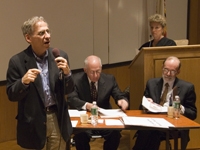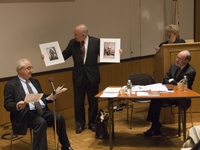
Stephen Gillers, the Emily Kempin Professor of Law at New York University, outlines the case of King Lear v. Goneril and Regan during a mock trial held in Weill Cornell's Uris Auditorium.
Estate battles can be fraught with controversy; even with wills and "family agreements" in place, myriad issues can arise. On Sept. 20, Weill Cornell's Humanities and Medicine Series, created and developed by Associate Dean for Academic Affairs Debra Gillers, explored these issues by asking a question based on one of the Shakespeare's most memorable lunatics: What if King Lear did not die (at the end of the play that bears his name) but instead survived, eventually petitioning the court for the return of his kingdom, claiming that he was "not competent" when he gave it to his daughters?
Staged as a mock trial before a packed Uris Auditorium, "King Lear v. Goneril and Regan" pitted teams of lawyers and medical expert witnesses battling before the Honorable Kristin Booth Glen, Manhattan's Surrogate Court judge, the borough court with jurisdiction over wills and estates.
In addition to Judge Glen, the other mock trial participants were uniquely suited for the case: Daniel Kornstein, as counsel for King Lear, is a veteran civil litigator who has previously defended both Hamlet and Shylock in mock courts based on Shakespeare; his opposing lawyer, Kenneth Warner, has been a trial lawyer for 30 years and is currently an adjunct professor at New York University School of Law, where he teaches trial advocacy. Medical expert witnesses included nationally renowned psychiatrists Dr. Paul Applebaum and Dr. Robert Michels, the University Professor of Psychiatry and Walsh McDermott University Professor of Medicine at Weill Cornell; and the case was narrated by Stephen Gillers, the Emily Kempin Professor of Law at New York University, with the role of King Lear played by Dominic Chianese, best known as "Uncle Junior" on HBO's "The Sopranos."
Although the trial provided ample opportunity for poking fun at the institutions of medicine and justice (Judge Glen to medical experts: "You both said that you're testifying with a degree of medical certainty, is that not an oxymoron?" to widespread laughter), it more clearly pointed out that these often idealized institutions are fraught with complicated questions of judgment.

Daniel Kornstein, cousel for King Lear, cross-examines Dr. Robert Michel, medical expert witness and Walsh McDermott University Professor of Medicine at Weill Cornell, as Manhattan Surrogate Court Judge Kristin Booth Glen and Dr. Paul Applebaum, medical expert witness and professor of psychiatry at Columbia University, look on.
Particularly during the cross-examination of medical expert witnesses, the definitions of abstract concepts like competence or delirium were called to task. As the trial evolved, the fundamental question of cognizance emerged: Did King Lear understand what he was giving away and that the gift was irrevocable?
Yet beyond the definitions of psychiatric terms, an immutable law of the American civil legal system reigned: as the plaintiff, Lear had the burden of proof.
In the words of Judge Glen: "The determination of capacity retroactively is incredibly difficult for a court to make. A reasoned decision is not necessarily a good decision, and we believe in the right of people to make bad decisions, unless it is a danger to themselves. In the gift context, the law has strong interest in sustaining gifts once they've been made; that is why we put the burden where we do in these cases. This is a case brought by Lear to get back what he gave away and he has the burden of proving that he lacked the functional capacity and rationality to make that gift. And so, under the ordinary standard in civil cases, which is preponderance of evidence—you don't need a lot, just enough to tip the balance—but he has not proven by the highest standard of clear and convincing evidence that he was under evidence of incapacity." Lear, at least for now, will remain tormented by his decision.
Photos by Amelia Panico.

